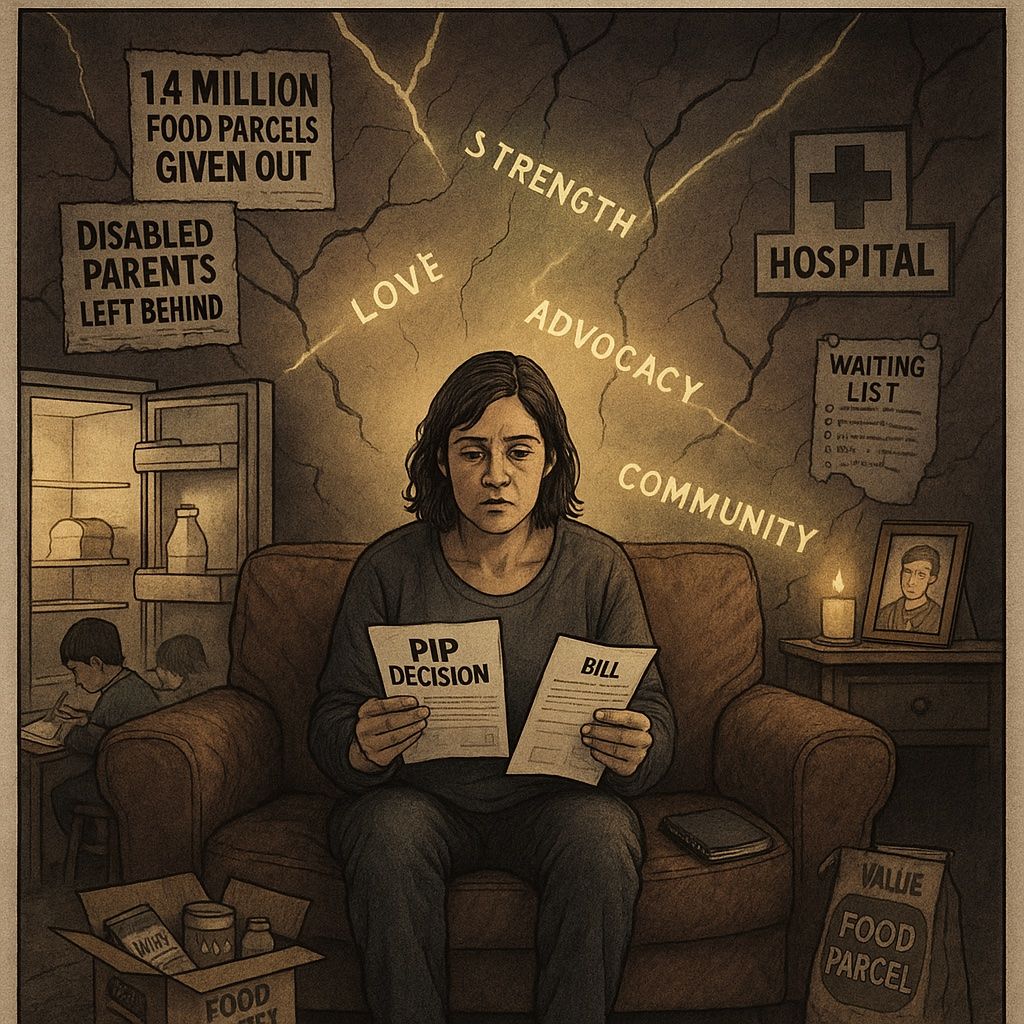

Nicola P
Left Behind Twice: Why Cuts to Mental Health and Disability Support Leave Us Nowhere to Turn
10 Jul, 2025TW: suicidal ideation; suicide
For years now, the government has pushed a narrative that disabled people and those with mental health needs simply require “a little help” to move closer to the job market. But what happens when even that little help isn’t available? What happens when every door you knock on for support is either shut, delayed for years, or opened just long enough to offer ten sessions and a leaflet?
I live with autism, ADHD, and complex physical health issues that make day-to-day life exhausting. I’m also a single parent, grieving the unimaginable loss of my child, and carrying the long shadow of trauma and abuse. And yet, when I’ve asked for mental health support, I’ve been made to feel like my suffering isn’t quite severe enough to qualify for real help.
The truth is, I have experienced suicidal thoughts. Not because I want to die—but because I can’t keep living like this. Because being constantly dismissed, abandoned, and left to cope alone has a devastating impact. I’ve waited so long for the specialist trauma support I was promised that I’ve now developed a physical tic. That’s what unprocessed trauma can do to a body. That’s what years of neglect does to a nervous system.
Eventually, I had to beg the adult treatment service just to be seen again. And even then, nothing is guaranteed. It’s not a question of need—it’s a question of funding. Whether there’s “capacity.” Whether you can be squeezed in for just enough sessions to get you functioning well enough to fall off their radar again.
What’s desperately missing from mental health support in this country is continuity. I’ve learned through experience that all it takes is one setback—one closed door, one missed appointment, one unexpected life event—and I’m right back to suicidal ideation. Not because I’m weak, but because everything becomes too overwhelming, too quickly, when you’re living without a safety net.
When you’ve lost two family members to suicide, and you’re left trying to survive on benefits that don’t even cover the cost of living, it becomes harder and harder to hold onto hope. The message seems to be: cope on your own, recover without help, and contribute without support. And if you can’t? Then you’re left behind.
And now, the cost-of-living crisis has pulled the rug out from under even the most basic sense of security. The cost of food is currently outrageous. One bag of essential shopping—enough for one evening meal for a family of four, plus maybe some bread, bin bags, and washing powder—can come to around £70 a shop, even when I’m buying supermarket own brands or everyday value ranges. One bag of shopping—maybe enough to make dinner for a single evening—can trigger anxiety, panic, even despair. Because I have no idea how I’m going to get through the rest of the week.
This is how I live now: one bag of food at a time. I remember when £100 a week used to stretch across the whole week. I’d be able to stock the fridge and cupboards and know that my children were fed. Now? I’m lucky if that gets me enough for two days. That means the cupboards are always bare. And still, no one in power seems to be taking proper account of the reality so many of us face.
To try and make ends meet, I’ve been selling my own clothes on Vinted—just to buy the basics for my children. Socks. Pants. Pyjamas. They grow fast, they eat a lot, and they deserve stability. But I’m constantly having to scramble to give them the essentials they need. I’m not trying to live extravagantly—I’m trying to survive.
Benefits are painfully low. My Personal Independence Payment (PIP), which should be used to manage my health conditions, now goes on petrol and bills. That means my health is deteriorating even more—and when your health declines, and there’s no one there to support you, the crisis deepens. It’s a vicious cycle that no one in government seems willing to break.
In fact, by refusing to provide adequate, continuous mental health support—especially for disabled people—the government is actively creating a bigger, more serious mental health pandemic in this country. And it will get worse. It already is.
I don’t want to live like this. I don’t want my children to see me living like this. I want to get better. Or at the very least, I want to have hope that things could one day feel a little more manageable. But that hope is wearing thin. Because the reality is, nothing is going to change overnight. It will take years for those in power to truly wake up and see what they’ve done.
We deserve better than this. We deserve a system that helps us heal, not one that pushes us closer to the edge. And we deserve a future where no one has to break in order to be believed.